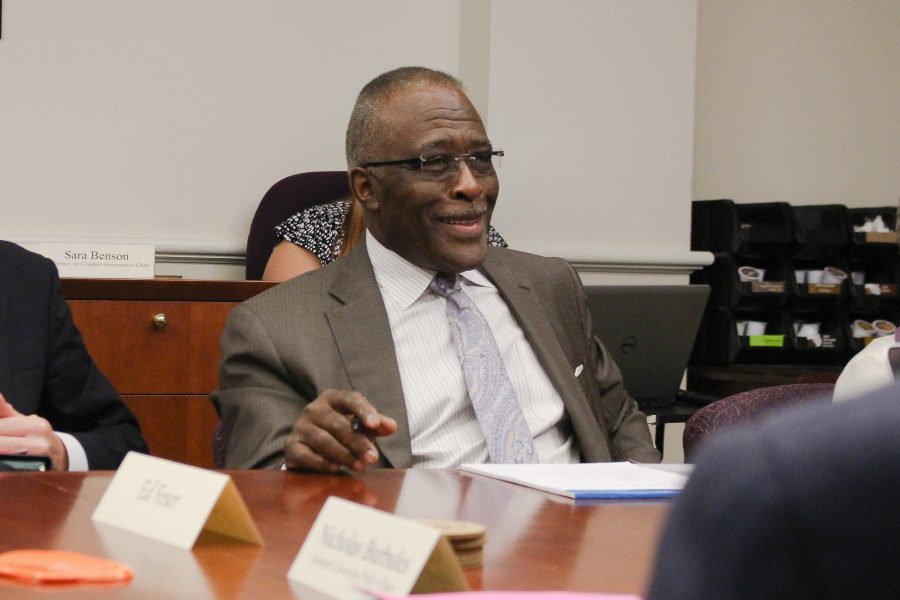Killeen, Jones optimistic about University’s budget outlook
President Timothy Killeen and Chancellor Robert Jones addressed the ongoing budget crisis at Monday’s annual meeting of the faculty. They acknowledged the challenges but remained hopeful about the situation.
Chancellor Robert Jones attends his first Senate Executive Commitee meeting in the English Building on Monday.
Nov 1, 2016
Chancellor Robert Jones and President Timothy Killeen did not shy away from the budget challenges facing the University in their addresses to the annual meeting of the faculty Monday.
Both acknowledged the University’s budget uncertainty due to the state budget impasse and legislative chaos that has engulfed Springfield. They lauded the faculty for its work during the crisis and touted their own efforts to help find solutions.
“While we recognize that budget stress in the past few years provides uncertainty at the state level is putting stress on each and every one of us and putting stress on this institution in almost every way you can think of, on faculty it’s both personally and professionally,” Jones said.
“I’ve been working very hard with the provost and the president and the system to find ways to keep this campus and the entire system competitive, and we will continue to do so because it is very, very important that we remain competitive in our compensation and in our programs to make this university great, and we need to do even better to make sure this remains a wonderful place to work and to live.”
Jones credited Killeen for his newfound positivity, calling him the most “optimistic and upbeat” person he has worked with. Killeen’s attitude was on display when he announced the checks from the state are arriving.
Get The Daily Illini in your inbox!
“I know because I stand out on the porch waiting for them and take them to the ATM as soon as they come,” he said.
Killeen admitted though the state support has started flowing in again, the University faces a “massive” deficit. Stopgap budget funding that kept the state functioning fell short of the totals from recent years, leaving the University short $190 million for fiscal years 2016 and 2017.
But Killeen said the University is “weathering it with principle decision making.” He has worked with presidents of other state universities to maintain pressure on state legislators.
“Maybe this is the optimism in me, but compared to a year ago, it’s not on the cutting room floor,” he said. “Higher ed is on the radar screen in Springfield. I think it’s an important place to be.”
One professor asked about grant funding for Ph.D. programs. She said it is hard to be student-centered when we cannot pay them at a rate to pay rent and eat.
She said it is a devil’s game because without grant money, the arts and humanities programs cannot have grad students. She asked Killeen to place more focus on graduate students and said each year, she always hears how great STEM disciplines are going.
“Someday, I’d like to come to a meeting and hear the chancellor or president say that the humanities rocked because I never hear it,” she said.
Valerie Hoffman, head of department of religion, said that as cuts have been handed down to colleges and then departments, she said the only place her small department could cut was in TA funds.
She said it is a Catch-22 because they had to reduce enrollment and general education courses, there is record enrollment and the department is penalized for smaller class sizes.
She said the more they are penalized, the more the small departments have to cut, and it is a “real crisis.”
Killeen agreed that they are in a real crisis and there has been a lot of shared sacrifice. He said his daughter is a TA so he knows how significant things are. He said they have tried to streamline administration and have reduced employees by 480 people to try and avoid large cuts in the academic field.
Lawmakers will likely not begin budget talks until January, but conversations about their consequences are already taking place at the University.






